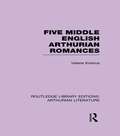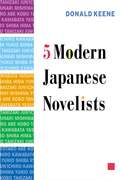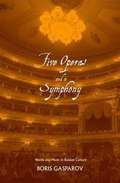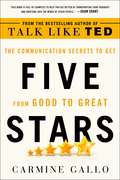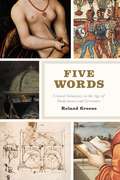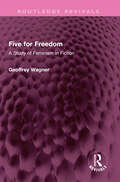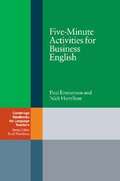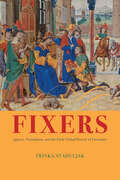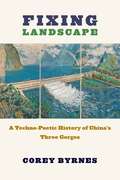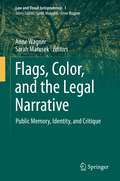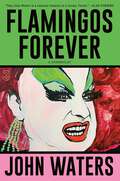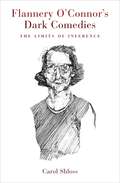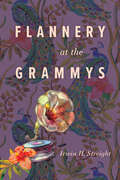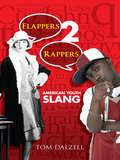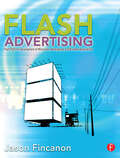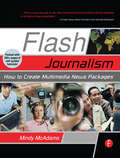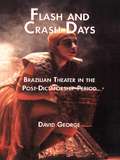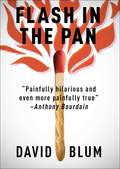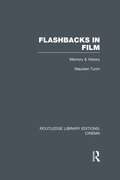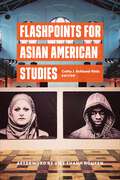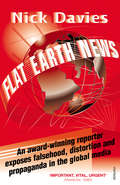- Table View
- List View
Five Middle English Arthurian Romances (Routledge Library Editions: Arthurian Literature #6)
by Valerie KrishnaThe poems in this collection will give the reader an appreciation of both the distinctiveness and the variety of the medieval English Arthurian tradition and highlight some of this important chapter in Arthurian legend literature.
Five Middle English Arthurian Romances (Routledge Library Editions: Arthurian Literature)
by Valerie KrishnaThe poems in this collection will give the reader an appreciation of both the distinctiveness and the variety of the medieval English Arthurian tradition and highlight some of this important chapter in Arthurian legend literature. The Middle English stories are different in style and structure to the later French romances, composed in poetic forms that derive from native English traditions. The Stanzaic Morte Arthur is the earliest version of the Lancelot-Guinevere story in English; The Awyntas off Arthure at the Terne Wathelyn is a serious moral poem while the story of the Avowing is a tail-rhyme romance. The Wedding of Sir Gawain and Dame Ragnell is a strongly folkloric variation of Chaucer’s Wife of Bath’s Tale and Syre Gawene and the Carle of Carlyle is an alternative version of the testing of Gawain. Originally published in 1991, the translator gives an introduction to each poem as well as a general introduction about the development of the Arthurian poetic tradition.
Five Modern Japanese Novelists
by Donald KeeneThe New Yorker has called Donald Keene "America's preeminent scholar of Japanese literature." Now he presents a new book that serves as both a superb introduction to modern Japanese fiction and a memoir of his own lifelong love affair with Japanese literature and culture. Five Modern Japanese Novelists profiles five prominent writers whom Donald Keene knew personally: Tanizaki Jun'ichiro, Kawabata Yasunari, Mishima Yukio, Abe Ko¯bo¯, and Shiba Ryo¯taro¯. Keene masterfully blends vignettes describing his personal encounters with these famous men with autobiographical observations and his trademark learned literary and cultural analysis. Keene opens with a confession: before arriving in Japan in 1953, despite having taught Japanese for several years at Cambridge, he knew the name of only one living Japanese writer: Tanizaki. Keene's training in classical Japanese literature and fluency in the language proved marvelous preparation, though, for the journey of literary discovery that began with that first trip to Japan, as he came into contact, sometimes quite fortuitously, with the genius of a generation. It is a journey that will fascinate experts and newcomers alike
Five Modern Japanese Novelists
by Donald KeeneThe New Yorker has called Donald Keene "America's preeminent scholar of Japanese literature." Now he presents a new book that serves as both a superb introduction to modern Japanese fiction and a memoir of his own lifelong love affair with Japanese literature and culture. Five Modern Japanese Novelistsprofiles five prominent writers whom Donald Keene knew personally: Tanizaki Jun'ichiro, Kawabata Yasunari, Mishima Yukio, Abe Kobo, and Shiba Ryotaro. Keene masterfully blends vignettes describing his personal encounters with these famous men with autobiographical observations and his trademark learned literary and cultural analysis. Keene opens with a confession: before arriving in Japan in 1953, despite having taught Japanese for several years at Cambridge, he knew the name of only one living Japanese writer: Tanizaki. Keene's training in classical Japanese literature and fluency in the language proved marvelous preparation, though, for the journey of literary discovery that began with that first trip to Japan, as he came into contact, sometimes quite fortuitously, with the genius of a generation. It is a journey that will fascinate experts and newcomers alike
Five Operas and a Symphony: Word and Music in Russian Culture
by Boris GasparovBoris Gasparov gazes through the lens of music to find an unusual perspective on Russian cultural and literary history. He discusses six major works of Russian music from the nineteenth and twentieth centuries, showing the interplay of musical texts with their literary and historical sources within the ideological and cultural contexts of their times. Each musical work becomes a tableau representing a moment in Russian history, and together the works form a coherent story of ideological and aesthetic trends as they evolved in Russia from the time of Pushkin to the rise of totalitarianism in the 1930s. Gasparov discusses Glinka's Ruslan and Ludmilla (1842), Mussorgsky's Boris Godunov (1871) and Khovanshchina (1881), Tchaikovsky's Eugene Onegin (1878) and The Queen of Spades (1890), and Shostakovich's Fourth Symphony (1934). Offering new interpretations to enhance our understanding and appreciation of these important works, Gasparov also demonstrates how Russian music and cultural history illuminate one another.
Five Stars: The Communication Secrets to Get from Good to Great
by Carmine Gallo“As technology threatens to displace countless jobs and skills, the ability to communicate is becoming more important than ever. This book is full of examples to help you get better at transporting your thoughts and emotions into the minds of other people.” —Adam Grant, New York Times bestselling author of Give and Take, Originals, and Option B with Sheryl SandbergHow to master the art of persuasion—from the bestselling author of Talk Like TED.Ideas don’t sell themselves. As the forces of globalization, automation, and artificial intelligence combine to disrupt every field, having a good idea isn’t good enough. Mastering the ancient art of persuasion is the key to standing out, getting ahead, and achieving greatness in the modern world. Communication is no longer a “soft” skill—it is the human edge that will make you unstoppable, irresistible, and irreplaceable—earning you that perfect rating, that fifth star.In Five Stars, Carmine Gallo, bestselling author of Talk Like TED, breaks down how to apply Aristotle’s formula of persuasion to inspire contemporary audiences. As the nature of work changes, and technology carries things across the globe in a moment, communication skills become more valuable—not less. Gallo interviews neuroscientists, economists, historians, billionaires, and business leaders of companies like Google, Nike, and Airbnb to show first-hand how they use their words to captivate your imagination and ignite your dreams.In the knowledge age—the information economy—you are only as valuable as your ideas. Five Stars is a book to help you bridge the gap between mediocrity and exceptionality, and gain your competitive edge in the age of automation.In Five Stars, you will also learn: -The one skill billionaire Warren Buffett says will raise your value by 50 percent.-Why your job might fall into a category where 75 percent or more of your income relies on your ability to sell your idea. -How Airbnb’s founders follow a classic 3-part formula shared by successful Hollywood movies.-Why you should speak in third-grade language to persuade adult listeners. -The one brain hack Steve Jobs, Leonardo da Vinci, and Picasso used to unlock their best ideas.
Five Words: Critical Semantics in the Age of Shakespeare and Cervantes
by Roland GreeneBlood. Invention. Language. Resistance. World. Five ordinary words that do a great deal of conceptual work in everyday life and literature. In this original experiment in critical semantics, Roland Greene considers how these words changed over the course of the sixteenth century and what their changes indicate about broader forces in science, politics, and other disciplines. Rather than analyzing works, careers, or histories, Greene discusses a broad swath of Renaissance and transatlantic literature—including Shakespeare, Cervantes, Camões, and Milton—in terms of the development of these five words. Aiming to shift the conversation around Renaissance literature from current approaches to riskier enterprises, Greene also proposes new methods that take advantage of digital resources like full-text databases, but still depend on the interpreter to fashion ideas out of ordinary language. Five Words is an innovative and accessible book that points the field of literary studies in an exciting new direction.
Five for Freedom: A Study of Feminism in Fiction (Routledge Revivals)
by Geoffrey WagnerFirst published in 1972 Five for Freedom is a candid study of five European fictional heroines as anticipatory of contemporary feminism: Madame de Merteuil of Choderlos de Laclos’ Les Liaisons dangereuses, Jane Eyre, Emma Bovary, Tess of the D’Urbervilles, and Tony Buddenbrook. Professor Wagner clearly believes that, in the first place, the role of women in the development of fiction has been underestimated, while the claims to originality of many recent female liberationists have been equally overestimated. This is a far-ranging, lightly-handled book with insights into both mode of fiction, as it developed and answered women’s demands, and into the role of some of its leading heroines; for Professor Wagner’s studies do not limit themselves strictly to the ‘five for freedom’ but foray into Balzac’s Cousine Bette, Catherine Earnshaw of Wuthering Heights, Anna Karenina, and Eca de Queiroz’s Portuguese Bovary in Cousin Bazilio. This brilliant little study is topical, readable, yet learned. It will be useful for scholars and researchers of literature, Women’s studies, and Gender studies.
Five-Minute Activities for Business English
by Penny Ur Paul Emmerson Nick HamiltonThis comprehensive resource book contains an easy-to-use set of short activities essential for anyone teaching Business English. Reflecting real-life business activities such as emails, noisy telephone conversations, making excuses, negotiating, handling customer complaints and cultural awareness, Five-Minute Activities for Business English helps teachers mirror the pacey feel of the work environment. This book is also of interest to teachers of general English who are looking for stimulating skills-based activities in meaningful contexts and complements both tailored and coursebook-based materials. The four main areas covered are 'Business topics', 'Business communication skills', 'Language work' and 'Exploiting coursebooks'. These areas feature activities on various topics such as money, finance, meetings, negotiations, telephoning, management, marketing, etc.
Fixers: Agency, Translation, and the Early Global History of Literature
by Zrinka StahuljakA new history of early global literature that treats translators as active agents mediating cultures. In this book, Zrinka Stahuljak challenges scholars in both medieval and translation studies to rethink how ideas and texts circulated in the medieval world. Whereas many view translators as mere conduits of authorial intention, Stahuljak proposes a new perspective rooted in a term from journalism: the fixer. With this language, Stahuljak captures the diverse, active roles medieval translators and interpreters played as mediators of entire cultures—insider informants, local guides, knowledge brokers, art distributors, and political players. Fixers offers nothing less than a new history of literature, art, translation, and social exchange from the perspective not of the author or state but of the fixer.
Fixing English
by Anne CurzanOver the past 300 years, attempts have been made to prescribe how we should and should not use the English language. The efforts have been institutionalized in places such as usage guides, dictionaries, and school curricula. Such authorities have aspired to 'fix' the language, sometimes by keeping English exactly where it is, but also by trying to improve the current state of the language. Anne Curzan demonstrates the important role prescriptivism plays in the history of the English language, as a sociolinguistic factor in language change and as a vital meta-discourse about language. Starting with a pioneering new definition of prescriptivism as a linguistic phenomenon, she highlights the significant role played by Microsoft's grammar checker, debates about 'real words', non-sexist language reform, and efforts to reappropriate stigmatized terms. Essential reading for anyone interested in the regulation of language, the book is a fascinating re-examination of how we tell language history.
Fixing Landscape: A Techno-Poetic History of China’s Three Gorges (Studies of the Weatherhead East Asian Institute, Columbia University)
by Corey ByrnesIn 1994, workers broke ground on China’s Three Gorges Dam. By its completion in 2012, the dam had transformed the ecology of the Yangzi River, displaced over a million people, and forever altered a landscape immortalized in centuries of literature and art. The controversial history of the dam is well known; what this book uncovers are its unexpected connections to the cultural traditions it seems to sever. By reconsidering the dam in relation to the aesthetic history of the Three Gorges region over more than two millennia, Fixing Landscape offers radically new ways of thinking about cultural and spatial production in contemporary China.Corey Byrnes argues that this monumental feat of engineering can only be understood by confronting its status as a techno-poetic act, a form of landscaping indebted to both the technical knowledge of engineers and to the poetic legacies of the Gorges as cultural site. Synthesizing methods drawn from premodern, modern, and contemporary Chinese studies, as well as from critical geography, art history, and the environmental humanities, Byrnes offers innovative readings of eighth-century poetry, paintings from the twelfth through twenty-first centuries, contemporary film, nineteenth-century British travelogues, and Chinese and Western maps, among other sources. Fixing Landscape shows that premodern poetry and visual art have something urgent to tell us about a contemporary experiment in spatial production. Poems and paintings may not build dams, but Byrnes argues that the Three Gorges Dam would not exist as we know it without them.
Flags, Color, and the Legal Narrative: Public Memory, Identity, and Critique (Law and Visual Jurisprudence #1)
by Anne Wagner Sarah MarusekThe book deals with the identification of “identity” based on culturally specific color codes and images that conceal assumptions about members of a people comprising a nation, or a people within a nation. Flags narrate constructions of belonging that become tethered to negotiations for power and resistance over time and throughout a people’s history. Bennet (2005) defines identity as “the imagined sameness of a person or social group at all times and in all circumstances”. While such likeness may be imagined or even perpetuated, the idea of sameness may be socially, politically, culturally, and historically contested to reveal competing pasts and presents. Visually evocative and ideologically representative, flags are recognized symbols fusing color with meaning that prescribe a story of unity. Yet, through semiotic confrontation, there may be different paths leading to different truths and applications of significance. Knowing this and their function, the book investigates these transmitted values over time and space. Indeed, flags may have evolved in key historical periods, but contemporaneously transpire in a variety of ways. The book investigates these transmitted values: Which values are being transmitted? Have their colors evolved through space and time? Is there a shift in cultural and/or collective meaning from one space to another? What are their sources? What is the relationship between law and flags in their visual representations? What is the shared collective and/or cultural memory beyond this visual representation? Considering the complexity and diversity in the building of a common memory with flags, the book interrogates the complex color-coded sign system of particular flags and their meanings attentive to a complex configuration of historical, social and cultural conditions that shift over time.Advance Praise for Flags, Color, and the Legal Narrative"In an epoch of fragmentation, isolation and resurgent nationalism, the flag is waved but often forgotten. The flag, its colors, narratives, shape and denotations go without saying. The red flag over China, the Star-Spangled Banner, the Tricolore are instantly recognisable and over determined, representing a people, a nation, a culture, languages, legacies, leaders. In this fabulous volume flags are revealed as concentrated, complex, chromatic assemblages of people, place and power in and through time. It is in bringing a multifocal awareness of the modes and meanings of flag and color in public representations that is particular strength. Editors Anne Wagner and Sarah Marusek have gathered critical thinkers from the North and South, East and West, to help know the essential and central - yet often forgotten and not seen - work of flags and color in narratives of nation, conflict, struggle and law. A kaleidoscopic contribution to the burgeoning field of visual jurisprudence, this volume is essential to comprehending the ocular machinery through which power makes, and is seen to make, the world."Kieran Tranter, Chair of Law, Technology and Future, Faculty of Law, Queensland University of Technology, Australia"This comprehensive volume of essays could not be arriving at a more opportune time. The combined forces of climate change, inequality, and pandemic are causing instability and painful recognitions of our collective uncertainties about nationhood and globalism. In the United States, where I am writing these few lines, our traditional red/white/blue flag has been collapsed into two colors: Red and Blue. While these colors have semiotically deep texts, the division of the country into these two colors began with television stations designing how to report the vote count in the 2000 presidential election year creating "red" and "blue" parties and states. The colors stuck and have become customary. We Americans are told all the time by pundits that we are a deeply divided nation, as proven by uns
Flamingo Supplementary Reader (English Second Language) class 11 - GSTB
by Gujarat State School Textbook BoardThe "Flamingo Supplementary Reader" for 11th grade English (Second Language), published by the Gujarat State School Textbook Board, provides students with a variety of engaging and diverse reading materials aimed at enhancing their English proficiency. It features a collection of stories, folk tales, poems, and moral lessons designed to promote both language development and critical thinking. The supplementary reader complements the main textbook by encouraging self-learning, creative thinking, and reading for pleasure. Through relatable content and exercises, it helps students develop comprehension, expand their vocabulary, and improve their language skills. The reader also focuses on real-life applications of English and aims to support students in excelling at national and international levels, particularly in competitive exams.
Flamingos Forever: A Screenplay
by John WatersOne part of John Waters’ iconic Trash Trilogy, Flamingos Forever is a dark-comedy screenplay about a drag queen trying to retain her title of “Filthiest Person in the World.”Fifteen years after the events of Pink Flamingos, Babs Johnson returns to Baltimore from a life spent largely in bus station lavatories, only to find that she once again has to fight for the right to claim the title of “World’s Filthiest Person.” Her nemesis Connie Marble’s sister, Vera Venninger, and her necrophiliac husband, Wilbur, are in her way. So begins a new battle of filth.This raucous, filthy—and essential!—volume in John Waters’ oeuvre never made it to the screen, so this is readers’ and his legions of fans’ one chance to see how this ghastly and irreverent saga meets its end!
Flannery O'Connor's Dark Comedies: The Limits of Inference (Louisiana Purchase Collection)
by Carol ShlossIn Flannery O'Connor's Dark Comedies, Carol Shloss moves from biographical, thematic, and theological approaches and instead focuses her criticism on the successes and failures of O'Connor as a rhetorician. This valuable study of O'Connor's style uses reader-response theory to dissect the author's use of hyperbole, distortion, allusion, analogy, the dramatization of extreme religious experience, the manipulation of judgment through narrative voice, and direct address to the reader. Schloss aims to return Flannery O'Connor to her readers on fathomable terms, to offer a rhetorical, rather than theological, perspective from which to understand the country preachers, square-jawed farm wives, wise rubes, foolish intellectuals, huckster Bible salesmen, killers, and other "good country people" who populate O'Connor's fiction.
Flannery at the Grammys
by Irwin H. StreightA devout Catholic, a visionary—and some say prophetic—writer, Flannery O’Connor (1925–1964) has gained a growing presence in contemporary popular culture. While O’Connor professed that she did not have an ear for music, allusions to her writing appear in the lyrics and narrative form of some of the most celebrated musicians on the contemporary music scene. Flannery at the Grammys sounds the extensive influence of this southern author on the art and vision of a suite of American and British singer-songwriters and pop groups. Author Irwin H. Streight invites critical awareness of O’Connor’s resonance in the products of popular music culture—in folk, blues, rock, gospel, punk, heavy metal, and indie pop songs by some of the most notable figures in the popular music business. Streight examines O'Connor's influence on the art and vision of multiple Grammy Award winners Bruce Springsteen, Lucinda Williams, R.E.M., and U2, along with celebrated songwriters Nick Cave, PJ Harvey, Sufjan Stevens, Mary Gauthier, Tom Waits, and others. Despite her orthodox religious, and at times controversial, views and limited literary output, O’Connor has left a curiously indelible mark on the careers of the successful musicians discussed in this volume. Still, her acknowledged influence and remarkable presence in contemporary pop and rock songs has not been well noted by pop music critics and/or literary scholars. Many years in the making, Flannery at the Grammys achieves groundbreaking work in cultural studies and combines in-depth literary and pop music scholarship to engage the informed devotee and the casual reader alike.
Flappers 2 Rappers: American Youth Slang
by Tom DalzellThis entertaining, highly readable book pulses with the vernacular of young Americans, tracing slang terms and expressions from the end of the nineteenth century to the present. In addition to alphabetical listings for each decade, it features fascinating word histories and sidebars about language and culture—jazz cat jive, the argot of Beat poets, gritty inner-city street talk, and other captivating colloquialisms.A master storyteller and wordsmith, Tom Dalzell is the author of The Concise New Partridge Dictionary of Slang and Unconventional English and The Routledge Dictionary of Modern American Slang and Unconventional English. In Flappers 2 Rappers, he presents more than just lists of words. His introductions to each chronological chapter offer fascinating insights into the ways in which slang reflects the era's historical mood and significance. Great for browsing, this unique reference will delight students of history as well as word and language enthusiasts.
Flash Advertising: Flash Platform Development of Microsites, Advergames and Branded Applications
by Jason FincanonCreate awe-inspiring, mind-blowing Flash ads, microsites, advergames, and branded applications that engage consumers and demonstrate their worth to clients. Creating Flash Advertising delivers the nuts and bolts of the development process from initial design conception to ad completion. You'll learn the best practices for: Mastering the myriad of ad specs, deadlines, quality and version control issues and creating ads that balance campaign goals with design constraints. Preparing and building ads with team and QC standards. Using forms and data in ads without file bloatt. File optimization techniques for swf files 3rd party rich media technologies that transcend the 30k banner. Integrating video into sites and banners. Social media applications. Trafficking and tracking ads for impressions, interactions, clicks, and conversions.Using ActionScript to save development time and implement team standards. Published projects developed with the practices and AS code presented in the book are available on the companion website http://www.flashadbook.com
Flash Journalism: How to Create Multimedia News Packages
by Mindy McAdamsThis book will assist journalists and Flash developers who are working together to bring video, audio, still photos, and animated graphics together into one complete Web-based package.This book is not just another Flash book because it focuses on the need of journalists to tell an accurate story and provide accurate graphics. This book will illustrate how to animate graphics such as maps, illustrations, and diagrams using Flash. It will show journalists how to integrate high-quality photos and audio interviews into a complete news package for the Web.Each lesson in the book is followed by a learning summary so that journalists can review the skills they have acquired along the way. In addition, the book's six case studies will allow readers to study the characteristics of news packages created with Flash by journalists and Web developers at The Washington Post, MSNBC.com, and Canadian and European news organizations.
Flash and Crash Days: Brazilian Theater in the Post-Dictatorship Period
by David GeorgeFirst published in 2000. Routledge is an imprint of Taylor & Francis, an informa company.
Flash in the Pan: Life and Death of an American Restaurant
by David Blum"Finally back in print, Flash in the Pan is the original--and still the best--reportage on the life and death of an American restaurant, a ground level view of every phase of its life. From the early, hope filled planning stages to the last, humiliating moments, it's a tragi-comic epic of hubris and human folly. Painfully hilarious and even more painfully true. This is a welcome reissue of a restaurant classic that should be read by every culinary and food service student in America and sit comfortably next to Orwell's Down and Out on every shelf." --Anthony Bourdain, author of Kitchen ConfidentialIn 1990, journalist David Blum got backstage access to the life and death of The Falls, a downtown Manhattan restaurant that captured the 1980s in all its extravagant excess. Its owners--a tanned, Brahmin barkeep and a handsome Irish firefighter from Queens--partnered with movie star pal Matt Dillon to cater to New York's most glamorous models, actors, and writers. Flash in the Pan captured in hilarious detail the quick decline and disastrous fall of The Falls, and has become a classic cautionary tale for anyone who might harbor the fantasy of opening a restaurant. David Blum is the editor of Kindle Singles, the storefront for high quality longform writing on Kindle. He was previously the editor in chief of The Village Voice and has written for New York magazine, Esquire, Vanity Fair, The New Yorker, and The New York Times Magazine. Flash in the Pan, first published in 1992, was his first book.
Flashbacks in Film: Memory & History (Routledge Library Editions: Cinema)
by Maureen TurimThe flashback is a crucial moment in a film narrative, one that captures the cinematic expression of memory, and history. This author’s wide-ranging account of this single device reveals it to be an important way of creating cinematic meaning. Taking as her subject all of film history, the author traces out the history of the flashback, illuminating that history through structuralist narrative theory, psychoanalytic theories of subjectivity, and theories of ideology. From the American silent film era and the European and Japanese avant-garde of the twenties, from film noir and the psychological melodrama of the forties and fifties to 1980s art and Third World cinema, the flashback has interrogated time and memory, making it a nexus for ideology, representations of the psyche, and shifting cultural attitudes.
Flashpoints for Asian American Studies
by Cathy J. Schlund–Vials, EditorEmerging from mid-century social movements, Civil Rights Era formations, and anti-war protests, Asian American studies is now an established field of transnational inquiry, diasporic engagement, and rights activism. These histories and origin points analogously serve as initial moorings for Flashpoints for Asian American Studies, a collection that considers–almost fifty years after its student protest founding--the possibilities of and limitations inherent in Asian American studies as historically entrenched, politically embedded, and institutionally situated interdiscipline. Unequivocally, Flashpoints for Asian American Studies investigates the multivalent ways in which the field has at times and—more provocatively, has not—responded to various contemporary crises, particularly as they are manifest in prevailing racist, sexist, homophobic, and exclusionary politics at home, ever-expanding imperial and militarized practices abroad, and neoliberal practices in higher education.
Flat Earth News: An Award-winning Reporter Exposes Falsehood, Distortion and Propaganda in the Global Media
by Nick DaviesDoes ‘fake news’ really exist? Find out from the ultimate insider.After years of working as a respected journalist, Nick Davies, in this shocking exposé, reveals what really goes on behind the scenes of this contentious industry. From a prestigious newspaper that allowed intelligence agencies to plant fiction in its columns, to the newsroom that routinely rejected stories due to racial bias, to the number of papers that accepted cash bribes. Gripping, thought-provoking and revelatory, this is an insider’s look at one of the most tainted professions.‘Meticulous, fair-minded and utterly gripping’ Telegraph‘Powerful and timely...his analysis is fair, meticulously researched and fascinating’ Observer
